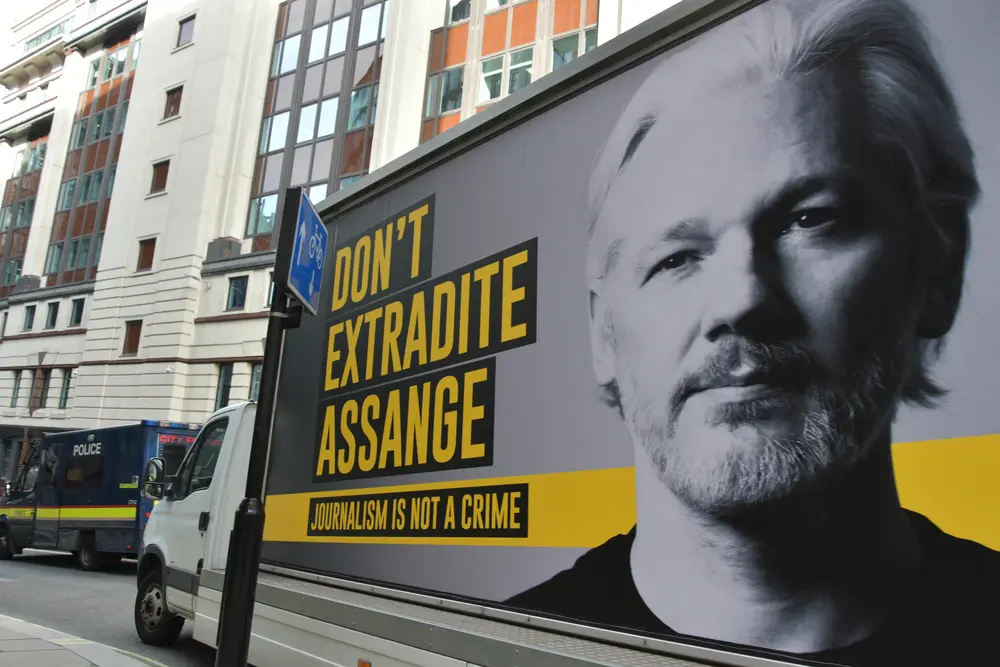
The UK’s High Court ruled on January 24th that Wikileaks founder Julian Assange has “an arguable point of law” and “can petition the UK’s highest court for a hearing,” Reuters reports. It follows two weeks after the U.S. won an appeal to have him extradited. Assange is wanted by U.S. authorities for publishing thousands of classified documents between 2010 and 2011. If convicted there, he faces a 175-year prison term for hacking.
The “arguable point of law” refers to the circumstances in which judges received and considered assurances from the U.S. about how Assange would be treated in prison, the High Court stated. Assange’s lawyers have previously argued that Assange’s fragile mental state and the prospect of extremely harsh solitary confinement conditions could lead to his suicide. Preventing this outcome, they claim, the U.S. could not guarantee.
Concretely, the ruling means that Assange can now petition the Supreme Court for a hearing, which it is under no obligation to accept. For now though, the petition would grant at least a temporary delay of his extradition. In practice, his case may now take many more months to come to a conclusion. It is yet another phase in a seemingly endless legal war—cleverly neologised as ‘lawfare,’—for the 50-year-old Australian. He is currently being held in London’s Belmarsh Prison, which is reserved for high-profile cases, particularly those concerning national security.
Stella Moris, Assange’s fiancé and mother of his two sons, pronounced the High Court ruling a victory but said that “we are far from achieving justice in this case.” At a gathering of sympathizers and press outside the court, she went on:
Let’s not forget that every time we win, as long as this case isn’t dropped, as long as Julian isn’t freed, Julian continues to suffer. For almost three years he has been in Belmarsh prison and he is suffering profoundly. Our fight goes on and we will fight this until Julian is free.
The U.S.’s most successful podcaster, Joe Rogan, whose reach around the world is significant, is also well-known for his sympathy towards Assange and his tribulations.
Joe Rogan, America's most listened to Podcast on Assange: "He exposed horrific crimes – he exposed things that US citizens are deeply opposed to"
— WikiLeaks (@wikileaks) January 23, 2022
A decision is due Monday whether to permit Assange to appeal the US extradition decision to the UK's Supreme Court #FreeAssangeNOW pic.twitter.com/hukrFWMsZn
Assange’s deteriorating physical and mental health have long alarmed human rights activists and organizations. They have frequently accused British authorities of maltreatment, a method of punishing Assange in the extralegal sense. Upon hearing the news, Amnesty International’s Deputy Research Director for Europe Massimo Moratti came out with a statement. While his organization welcomed the High Court’s decision on the matter of assurances by the U.S., it was “concerned” the court had “dodged its responsibility” on ensuring that issues of public importance were fully considered by the judiciary. “The courts must ensure that people are not at risk of torture or other ill-treatment. This was at the heart of the two other issues the High Court has now effectively vetoed,” he went on, adding that the Supreme Court should have had the chance to consider and rule on all the points of law raised by Mr. Assange. “If the question of torture and other ill-treatment is not of general public importance, what is?” he added.
Other organizations involved in aiding journalists and their work also welcomed the ruling, but expressed equal reservation and concern. Deputy Executive Director Robert Mahoney for the Committee to Protect Journalists said that “the prosecution of the WikiLeaks founder in the United States would set a deeply harmful legal precedent that would allow the prosecution of reporters for news gathering activities and must be stopped. We strongly encourage the U.S. Justice Department to halt extradition proceedings and drop all charges against Assange.” The sentiment was echoed by Michelle Stanistreet, General Secretary of the National Union of Journalists, who said that the case was “damaging media freedom every day that it dragged on,” adding that “the U.S. is seeking Assange on charges that relate to the very business of gathering and processing news. For so long as this is treated as a potentially indictable offense, reporters, doing important work, will be looking over their shoulders.”
Assange’s lawyers now have two weeks to make the application to the Supreme Court.
